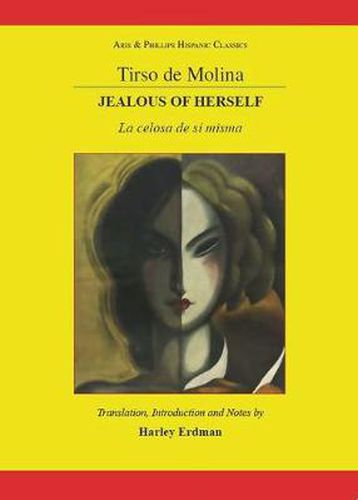Readings Newsletter
Become a Readings Member to make your shopping experience even easier.
Sign in or sign up for free!
You’re not far away from qualifying for FREE standard shipping within Australia
You’ve qualified for FREE standard shipping within Australia
The cart is loading…






Tirso de Molina’s Jealous of Herself (c. 1622-23) is an ingenious comedy of disguise and deception, set in the streets, plazas and fashionable apartments of early 17th-century Madrid. Nearly forgotten for almost 400 years, the play is starting to gain attention today for its very modern perspective on male desire and the difficult situation placed on women who must live up to an ideal fantasy projected onto them. Much like another product of early 17th-century Spain, Miguel de Cervantes’s world-famous novel Don Quixote , Jealous of Herself follows a lofty-minded man who worships an idealised image of a woman. It then shows us a world that gets turned upside down when other characters end up playing into this fantasy. Unlike Don Quixote, however, Jealous of Herself shifts its attention from the dreamer to the dreamed that is, to the individual trapped in and torn apart by this fantasy, the young woman, Dona Magdalena. Her internal conflict, the fact that she finds herself jealous of herself, ultimately becomes the axis of the play.
Jealous of Herself is also a lively, wonderful piece of theatre. Written by a highly inventive playwright at a time when the Spanish theatre was at its peak, it has fascinating lead characters, verbal dexterity, rapid-fire wit and a strong sense of mood and place. Carefully structured, it builds relentlessly, climaxing with two great set-piece scenes that deserve to be on any list of great Renaissance-era stage moments. Until now, the play, whose Spanish title is La celosa de si misma , has been unavailable to English-language readers and audiences. This book is the first-ever English translation.
$9.00 standard shipping within Australia
FREE standard shipping within Australia for orders over $100.00
Express & International shipping calculated at checkout
Tirso de Molina’s Jealous of Herself (c. 1622-23) is an ingenious comedy of disguise and deception, set in the streets, plazas and fashionable apartments of early 17th-century Madrid. Nearly forgotten for almost 400 years, the play is starting to gain attention today for its very modern perspective on male desire and the difficult situation placed on women who must live up to an ideal fantasy projected onto them. Much like another product of early 17th-century Spain, Miguel de Cervantes’s world-famous novel Don Quixote , Jealous of Herself follows a lofty-minded man who worships an idealised image of a woman. It then shows us a world that gets turned upside down when other characters end up playing into this fantasy. Unlike Don Quixote, however, Jealous of Herself shifts its attention from the dreamer to the dreamed that is, to the individual trapped in and torn apart by this fantasy, the young woman, Dona Magdalena. Her internal conflict, the fact that she finds herself jealous of herself, ultimately becomes the axis of the play.
Jealous of Herself is also a lively, wonderful piece of theatre. Written by a highly inventive playwright at a time when the Spanish theatre was at its peak, it has fascinating lead characters, verbal dexterity, rapid-fire wit and a strong sense of mood and place. Carefully structured, it builds relentlessly, climaxing with two great set-piece scenes that deserve to be on any list of great Renaissance-era stage moments. Until now, the play, whose Spanish title is La celosa de si misma , has been unavailable to English-language readers and audiences. This book is the first-ever English translation.